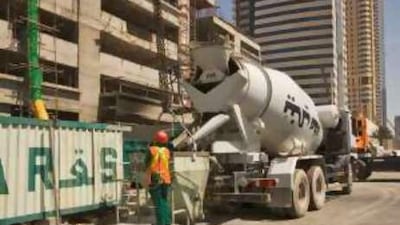The liquidity crisis and global recession will trigger a slowdown in growth of the construction sector over the next two years, crushing cement producers' profits, according to a report by Al Mal Capital, an investment bank. The report, released yesterday, forecast growth to slow this year to 15 per cent, from 20 per cent, and then drop to 13 per cent next year and in 2010. It also predicted an oversupply of cement in the UAE by the end of 2010. "We have an overall negative view on the cement sector due the slowdown of the construction industry, coupled with extensive expansion of clinker and cement capacity in the market," the report said. As demand for cement soared earlier this year, with widespread reports of the emergence of a black market to avoid price controls, major producers increased production at facilities in the northern Emirates. The new production is coming online just as analysts are predicting cancellations or delays in major projects. Mustafa Gorgunel, the marketing manager for Union Cement Company (UCC), one of the country's largest producers, said there was likely to be a slowdown in cement consumption next year, but the industry would weather the storm. "The consumption will go down slightly," he said. "Some projects on paper have been put on hold, that's what we're hearing." Mr Gorgunel said the slowdown would hit Dubai harder than Abu Dhabi, because fewer projects there were being built by government-backed firms. Facing a glut of product, major producers might be forced to export, most likely to the African market. Since 2003, the UAE has imported cement to keep pace with the construction boom. Al Mal predicted that domestic production would outstrip demand by 2010. Mr Gorgunel said UCC would face less difficulty next year than earlier this year, when cement makers were caught between rising costs for energy and government-imposed price caps. In the first nine months of the year, the combined profit of the GCC's listed cement companies fell 15 per cent, according to data compiled by Global Investment House in Kuwait. Profits fell to US$1.46 billion (Dh5.36bn), from $1.72bn a year earlier. Al Mal said the price caps continued to pose difficulties to producers. "To compound the issue, the increase in production costs cannot be passed on to the consumer due to government-imposed price caps - consequently gross profit margins have been squeezed from a sector average of 45 per cent in 2006 to 30 per cent in 2008," the company said. The report also expects three of the country's key producers - National Cement Company (NCC), Arkan Building Materials and Union Cement - to underperform the market. Al Mal said all three companies had overvalued share prices. "Although the share prices of UCC, NCC and Arkan have held up well through the recent market turmoil, we believe these stocks could be impacted going forward." But Mr Gorgunel was adamant that UCC was large enough to get through the difficult period with little trouble. "For Union Cement, we don't see any sign yet, we're still strong," he said. "I don't know where they got this opinion." cstanton@thenational.ae agiuffrida@thenational.ae

Cement sales weighed down
Construction will slow by up to 20 per cent this year, and fall by more than half that in the period up to 2010 says bank.
Most popular today
